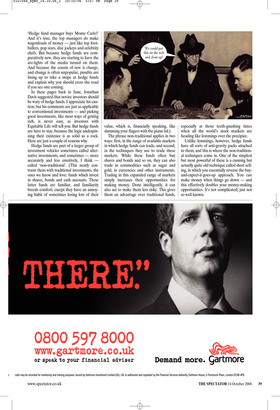Every home should have a hedge fund
John Andrews says investing is like motoring: it’s not the vehicle that’s dangerous but the way it’s driven Dave wins millions on the lottery, and the first thing he does is sprint down to the nearest Ferrari showroom and jump into the latest model with extra-deep bass woofers and a little fold-down table for his can of Red Bull. His mother spits out her tea with fright. ‘You’ll kill yourself!’, she screams. ‘Why don’t you buy something safer, like a Vauxhall?’ ‘Mam’, he says, ‘if I drive the Ferrari at 200 mph down the wrong side of the M1, blindfold... ’ his mother starts to hyperventilate, ‘... you’re right, I’ll kill myself. But if I drive it at 4 mph in the middle of a field, nothing will happen. It’s not the car, it’s how you drive it.’ Mam goes to put the kettle on, and thinks for a while. She comes back. ‘All right,’ she says, ‘I don’t mind about the Ferrari. But you must promise me one thing — you won’t go putting any of your money into one of those hedge fund thingies, will you?’ Dave sighs and says: ‘Mam — what I said about the Ferrari? Hedge funds are just the same.’ Now while Ferraris get nothing but a good press, you can’t say the same about hedge funds. Occasionally a big one hits an iceberg, making a field day for the I-toldyou-so brigade. You may well have read recently about a US-based fund called Amaranth, which — although the full story is yet to emerge — appears to have made some catastrophic but actually rather simple mistakes speculating on natural gas prices. Then you’ll see headlines like ‘Hedge fund manager buys Monte Carlo!’ And it’s true, the top managers do make wagonloads of money — just like top footballers, pop stars, disc jockeys and celebrity chefs. But because hedge funds are comparatively new, they are starting to have the arc-lights of the media turned on them. And because the cousin of new is change, and change is often unpopular, pundits are lining up to take a swipe at hedge funds and explain why you should cross the road if you see one coming.
In these pages back in June, Jonathan Davis suggested that novice investors should be wary of hedge funds. I appreciate his caution; but his comments are just as applicable to conventional investments — and picking good investments, like most ways of getting rich, is never easy, as investors with Equitable Life will tell you. But hedge funds are here to stay, because the logic underpinning their existence is as solid as a rock. Here are just a couple of reasons why.
Hedge funds are part of a larger group of investment vehicles sometimes called alternative investments, and sometimes — more accurately and less emotively, I think called ‘non-traditional’. (This neatly contrasts them with traditional investments, the ones we know and love: funds which invest in shares, bonds and cash accounts. These latter funds are familiar, and familiarity breeds comfort; except they have an annoying habit of sometimes losing lots of their value, which is, financially speaking, like slamming your fingers with the piano lid.) The phrase non-traditional applies in two ways: first, in the range of available markets in which hedge funds can trade, and second, in the techniques they use to trade these markets. While these funds often buy shares and bonds and so on, they can also trade in commodities such as sugar and gold, in currencies and other instruments. Trading in this expanded range of markets simply increases their opportunities for making money. Done intelligently, it can also act to make them less risky. This gives them an advantage over traditional funds, especially at those teeth-gnashing times when all the world’s stock markets are heading like lemmings over the precipice.
Unlike lemmings, however, hedge funds have all sorts of anti-gravity packs attached to them, and this is where the non-traditional techniques come in. One of the simplest but most powerful of these is a cunning but actually quite old technique called short selling, in which you essentially reverse the buyand-expect-it-goes-up approach. You can make money when things go down — and this effectively doubles your money-making opportunities. It’s not complicated; just not so well known.



































































































 Previous page
Previous page